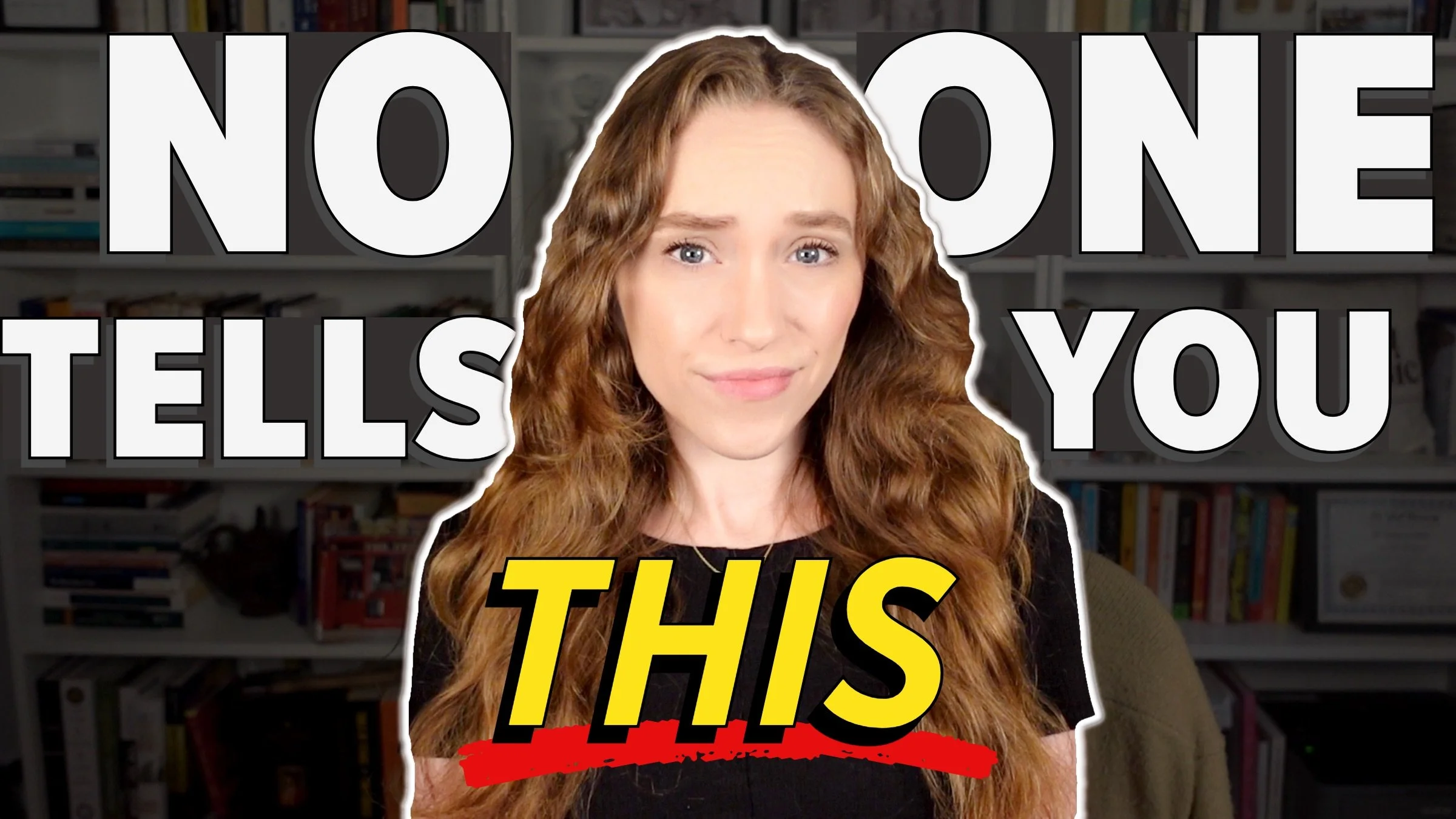Overused Plot Tropes to Avoid
HIT PLAY OR READ THE POST BELOW:
As a professional book editor, I'll be the first to admit that plotting a book is hard. You might know that you want your character to get from point A to point B, but all the stuff in the middle is confusing, and you're not quite sure how exactly they're going to get there.
The parts in between main action points can be the most challenging to write, and because of that, sometimes writers will lean on overused plot tropes to progress the story. But these clichés are actually going to hurt your story more than they help. Leaning on too many clichés can make the reader question your authority as a storyteller and ultimately lead to them disengaging with the novel, which is the last thing you want.
So, in this article I’m going to identify a list of common plot tropes that I would recommend avoiding in your story. I will also offer some strategies for what you can do instead. With these tips, I want to help you craft a story that is more believable, engaging, and immersive.
Keep in mind that I'm not saying that these cliché plot devices are entirely off limits. You will see many of them in published books out there today and you may have some of them in your manuscript right now. That doesn't mean that you can't use them. I just want you to proceed with caution and be aware that they are a bit overdone in the current marketplace.
Finding a Secret Diary
The first overused plot trope is finding a secret diary. Anytime I see a diary appear in a work of fiction, I admittedly roll my eyes. That said, I totally understand why authors leverage the diary as a plot device. It’s an effective way for one character to learn information about another character that they wouldn’t share out loud.
But, far too often, the discovery of the diary feels overly convenient. It’s usually out on the dresser or in an unlocked drawer. In this digital age, where nearly everyone keeps private content locked away behind passwords and face ID, the physical diary just feels outdated and unrealistic.
What I recommend doing instead is trying to craft a more creative way for the character to discover that secret information. For instance, say that Jill stumbles upon Jack's diary where he admits he is in love with Lucy. Instead of this, perhaps Jill could come across a romantic gift that Jack is planning to give to Lucy, revealing his intentions in a more believable and roundabout way.
An Unexpected Pregnancy
The second overused plot trope is an unexpected pregnancy. It's completely true that unexpected pregnancies happen in real life. But in fiction, unexpected pregnancies can feel like a cheap trick to amplify the emotional stakes of the story.
Often, these unexpected pregnancies come out of abusive situations where female characters are being sexually assaulted, and it's almost so predictable that if the reader sees an assault scene, they’ll expect a pregnancy later on.
Something that is a bit frustrating with the unexpected pregnancy trope is that in most cases, the characters don't seem to expect it at all. They don't even consider it a possibility. So the reader faces this interesting experience where they are fully expecting a pregnancy while the protagonist obliviously ignores the signs.
If you have an unexpected pregnancy in your story, I would recommend just being cautious and making sure it is actually integral to the story. Make sure that you aren't just using this unexpected pregnancy to incapacitate your character or inflict unnecessary trauma upon them.
If you determine that the pregnancy is necessary to the progression of the plot, then consider making it so that the character is concerned about the possibility of pregnancy. That way, the reader’s expectations are aligned to the character’s concerns, rather than the character being totally blindsided.
Police Revealing Sensitive Information
The next overused plot trope to avoid is police revealing sensitive information about a case. This comes up all the time in suspense, mystery, and thrillers, but could also come up in any other genre where there is a police or detective character.
This is when a police officer or detective reveals information in a story that would actually be kept confidential in real life. They give details about a crime scene, evidence, or potential suspects. It’s also usually prefaced by a phrase like, “I shouldn’t be telling you this, but…”
While instances like this probably happen in real life, in a story, it feels like the writer is just using this trope as a convenient way for the character to get information they otherwise would not have gotten. The more sensitive the information, the more obvious it is that the police officer/detective character is revealing information simply to move the story forward.
Unless you are specifically portraying the police officer or detective as a corrupt or sloppy individual, I recommend having them keep private information to themselves. This is especially true if the main character is potentially a suspect themselves. In that case, police officers would be especially close-lipped about any case proceedings.
To resolve this issue, I would first recommend considering if there are any other ways the character can come across information about the case, such as through their own snooping or through interviewing victims and witnesses on their own.
If there truly is no other way for them to get the information, then start considering how the officer or detective could reveal case information in a more realistic way. For instance, if the officer is sympathetic to the main character, perhaps they reveal sensitive information in a deliberate and strategic way. Alternatively, if the officer/detective has their own agenda, perhaps they reveal information so that the main character brings positive results for them, too. For instance, they might divulge sensitive information because they think it will provoke the main character to give them additional information they want.
By considering the police officer or detective characters as individuals with their own agendas, it will better justify an otherwise unrealistic reveal of sensitive case information.
The Unexpected Twin
The next overused plot trope to avoid is an unexpected twin. Readers have learned to expect this twist if a character does something that just doesn't suit what is known about them. Perhaps this is a buttoned-up character who suddenly steals something, for instance. The reader might wonder why they did that, and then discover later that it was the character’s identical twin who no one knew about.
In a lot of ways, this cliché is hard to believe. First, twins are statistically not very common, and identical twins even less so. Because of that, it’s also unbelievable that no one in the sphere of community of the character would not know that they had a twin, the character included.
I'm not saying that you can't write characters that are twins. I would just be very careful with how you use them, making sure you're not leaning on them as a convenient plot device. Making a big show out of the twin’s reveal can feel like they are a plot device slapped onto the story, rather than something that was organically woven in from the very beginning.
If you establish from the very beginning that this character has an identical twin and they get mixed up with each other, then it can make for a rich characterization that adds a justification for their being twins. But if you just slap a twin element on whenever it's convenient, it is going to feel haphazard and overused.
Especially since this trope is prominent in popular media, such as with the movie The Parent Trap, you don't want your story to feel like it is derivative. If you want to make twins a part of your story, be thoughtful with how you portray them and consider acknowledging them as twins from the very beginning.
Convenient Amnesia
The last overused plot trope to avoid is convenient amnesia. This happens if authors want to make the circumstances surrounding a period of time mysterious or they want to shield a character from knowing what happened during a specific time. It can manifest as a character having literal amnesia from a head trauma or as the character having abused drugs or alcohol and then blacking out.
Again, amnesia and blackouts certainly happen in real life. But in fiction, they can feel overused because they are often deployed as a convenient way of making the character forget something consequential. An author uses this device so that the readers don't have to face the immediate consequences of whatever was forgotten.
This trope keeps both the reader and the character in suspense of what happened, because dealing with the truth immediately would require the plot to unravel in a different way. So instead of knowing everything immediately, we must wait to figure out what actually happened. It's a means of information delay.
A more realistic way to use information delay in your story is through having tension come from a lapsed memory, rather than complete memory failure. For instance, you could have a character’s memory stay intact but then have another character provide an alternate version of events, causing the first character to question their own reality and wonder if their memory is correct. This way, the reader will still be kept in suspense. Plus, we will see different stories from different characters, making us eager to know who is actually telling the truth.
I hope this list of common plot tropes in fiction helps you craft a more original story! If you have used one of these tropes before, it is totally okay. In certain circumstances, they can be used effectively, but it helps to educate yourself on overused plot tropes so you can watch out for them.
Thanks so much for reading and happy writing!





